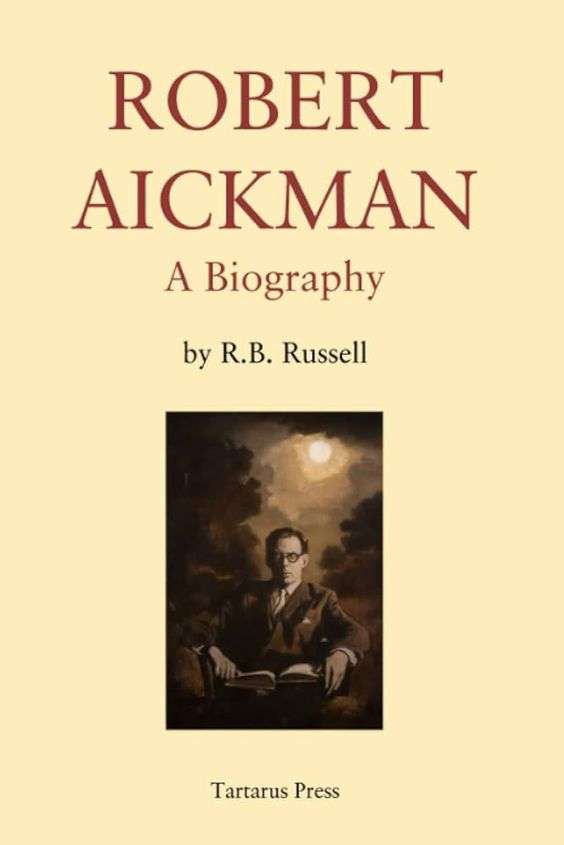We’ve implemented some new protocols around sending us messages via this website. Please email website “at” britishfantasysociety “dot” org for any issues.

For all things fantasy, horror, and speculative fiction
-
Announcement:

Robert Aikman
ROBERT AIKMAN: A BIOGRAPHY by R B Russell
Tartarus Press p/b £25.00
Review by Nigel Robert Wilson
Robert Aikman, sometime writer of what he described as `strange tales’, the co-founder and first Chairman of the Inland Waterways Association, was an ambiguous person. He was either appreciated or disliked. The same criterion applies to his literary output. In this biography, R B. Russell has put his familiar thoroughness to the wheel to provide us with an insight into the man himself. It makes for a good, solid read, leaving nothing out, although Russell shows a very native aversion for political detail.
Many readers of Aikman’s `strange tales’ are often puzzled by their lack of purpose, excited by their potential, only to become frustrated at the conclusion. Aikman admits to being a Freudian, whereas readers of `strange tales’ might be inclined to a more Jungian outlook. Russell’s very detailed deconstruction of Aikman reveals a difficult man, very representative of his social origin, background and time, complete with all the associated prejudices.
Aikman is clearly a late product of the Edwardian middle classes that the Great War made extinct. The gentry with land could evolve, but those dependent upon selling their skills to their own class could not. Educated as a weekly boarder at a public school, Aikman acquired the values of service inherent to that status but realised his family did not have the funds to send him to either Oxford or Cambridge. The alternative of sending him as a day-student to a college associated with London University was ignored, causing Aikman to muddle through with a struggling family architectural business but lacking any suitable training. Aikman, clearly a survivor, fell back on the writings of his now-deceased grandfather, Richard Marsh, to create his own literary agency.
The outbreak of the Second World War caused Aikman to register as a conscientious objector. The fact that he was so short-sighted he was of no practical use to any of the military or civilian services caused his protestation of pacifism to be disregarded. No doubt, if he had been of the working class and a member of the Peace Pledge Union, he would have found himself in Pentonville picking oakum and sewing mailbags for the duration. Aikman’s disengagement from the war placed him in a good position to develop the Inland Waterways Association when it was first conceived by L T C Rolt, an engineer, the writer of `Narrow Boat’ and ghost stories.
With the Inland Waterways Association, Aikman discovered his romantic purpose, causing him to become its knight-errant to tilt at the vested interests that had caused the canals of Britain to become a neglected asset. In many ways, this was the making of Aikman, placing him in a public position of considerable wisdom and virtue. Of course, in any voluntary association, there are differences of opinion, but given that he ran the organisation, Aikman would have the final say. The issue of the canals persists to this day, but without Aikman they would be in far, far worse condition with nobody to fight on their side.
Aikman’s own writing matured, and his skills as an editor are evident in many later anthologies. These are listed in an excellent appendix. Aikman was a difficult character who did not build bridges with others, and people either liked him, or they didn’t. If anything, this biography allows the reader to feel a bit sorry for him.
Explore the blog:
Blog categories:
Latest Posts:
Tags:
#featured (56) #science fiction (25) Book Review (264) events (44) Fantasy (231) Graphic Novel (13) horror (136) Members (62) Orbit Books (48) profile (43) Romance (17) Science Fiction (50) short stories (28) Titan Books (52) TV Review (15)
All reviews
Latest Reviews:
- THE HOUSE ON THE BORDERLAND by William Hope Hodgson
- Monstrum by Lottie Mills
- Mood Swings by Dave Jeffery
- Yoke of Stars by R.B. Lemberg
- Hera by Jennifer Saint
- The Black Bird Oracle by Deborah Harkness
- RETURN OF THE DWARVES By Markus Heitz
- Delicious in Dungeon
- Toxxic by Jane Hennigan
- THIS ISLAND EARTH: 8 FEATURES FROM THE DRIVE-IN By Dale Bailey
Review tags:
#featured (2) Action (4) Adventure (4) Book Review (28) Fantasy (18) Featured (2) Feminist (2) Gothic Horror (3) Horror (14) Magic (3) Orbit Books (3) Romance (6) Science Fiction (5) Swords and Sorcery (2) Titan Books (7)